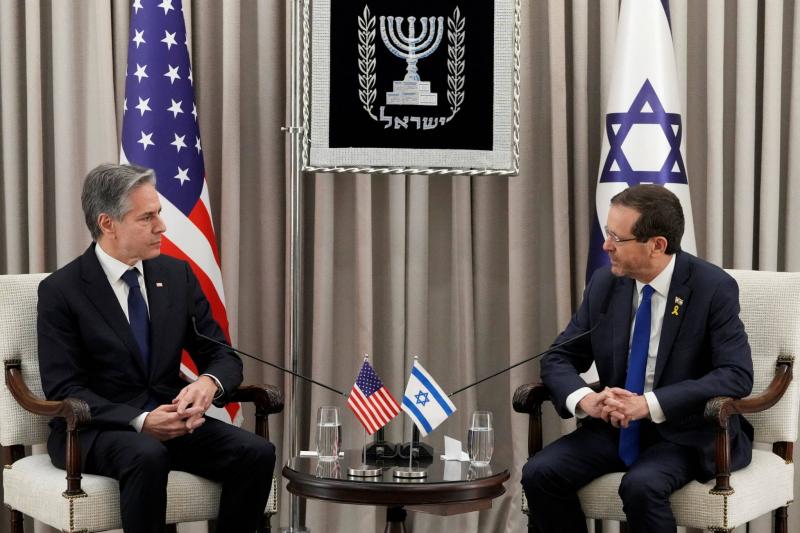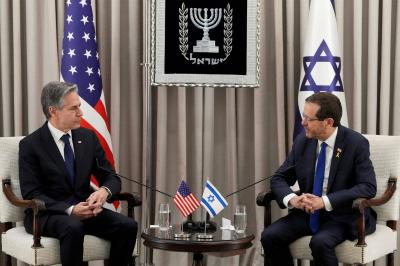The American magazine "Time" preempted U.S. Secretary of State Antony Blinken's fifth visit to the region with the provocative headline: The Envoy: Secretary of State Antony Blinken and the Test of American Leadership! Since Blinken's third visit, the objective has become clear: to stop the war, secure the release of Israeli hostages held by Hamas in Gaza, and pursue a two-state solution. There are further details such as increasing aid to the sector of all kinds, preventing the displacement of Palestinians, and considering reconstruction. These are the same demands that were raised at the Arab-Islamic summit conference in Riyadh during the second week after the onset of the massive war. "Time" considers the fulfillment of these demands a crucial test for American leadership and its influence in the Middle East.
On the shoulders of Biden, Blinken, and American strategic thinking rest the burdens and responsibilities of two failed wars in Afghanistan and Iraq, a war ongoing in Ukraine for over two years, and the dangers of an expanding conflict surrounding Gaza, justified by Iran and its militias. Last but not least, the resistance of Netanyahu's right-wing government to American desires and requests, mainly the cessation of hostilities and the two-state solution.
Skepticism regarding American leadership and the American role in the Middle East and the world does not stem solely from these specific wars or is limited to them. Fareed Zakaria's book "Post-American World," published in 2004, reflects this sentiment. Since then, dozens of books and studies with similar titles have emerged, which not only mourn the American role but also discuss the failure or defeat of the West, the latest being Emmanuel Todd's book: The Defeat of the West or Its Breakdown! In these strategic reflections, America symbolizes the West or the Western bloc in the Americas and Europe. It is well known that the twentieth century has come to be called the American century, and these mourners suggest that the twenty-first century may well be referred to as the Chinese century!
The two immediate issues justifying this labeling are: the growing and significant role of China in the global economy, and America's compelled defensive maneuvers to protect its strategic interests and those of the West, which it dominates, by engaging in covert or direct wars, nearly all of which it seems to be losing, leading to increased internal division and evident fractures among its allies in Europe as everyone edges toward uncertain or unknown destinies.
It is worth noting that the United States had previously announced since Obama’s days a strategic shift towards China and East Asia across land, sea, air, and economic trends, indicating a potential "withdrawal" or reduction of its role in the Middle East. However, with the emergence of ISIS yesterday and today (amid the Gaza war and Iranian provocations), American officials have reiterated that the U.S. will remain in the Middle East to maintain both stability and interests.
Additionally, this grim discourse that replaces America with the entire West is not new and dates back to the Vietnam War, indeed even further back to post-World War I with Oswald Spengler's "Decline of the West," and the emergence of the Frankfurt School of critical theory which criticized modernity in the West and objectified humanity, alongside the appearance of totalitarian states with democratic facades. In the 1960s and 1970s, amidst the Vietnam War and the student revolution of 1968, radical critiques emerged against the Enlightenment values that shaped modern Western civilization, which came to be seen as a global living system. During this period, new leftists began to criticize the colonial discourse (symbolized by Edward Said's Orientalism of 1978), which grew into a substantial current within Subaltern Studies that continues to proliferate, directing cursing towards the West and its civilization, condemning the modern state and globalization which they argue destroys itself and the world!
According to these proliferating literatures, many of which originate from within the United States, there is a focus on the competitive Chinese economy and growth, but it does not stop there; it also encompasses the established principles of Western civilization and the living system in the world, led by the United States through ideas and institutions. Fareed Zakaria, author of the 2004 book "Post-American World," penned an article in the latest issue of Foreign Affairs (January/February 2024), urging America not to abandon the world it created! He acknowledges setbacks and mistakes; however, there are no immediate or clear alternatives to consider. Thus, despite justified pessimism, it is still premature to speak of a post-American world!
However, proponents of civilization's collapse at the hands of its own descendants or generations question the "message" that America and the West carry: what it was and what it is now. The German sociologist Max Weber (1864-1920) identified two paths for politicians and thinkers: the path of the mission they carry or the task they want to accomplish (= ethics of conviction) and the ethics of responsibility or ethics of action. At the thresholds of the end of the American century, the mission has become neither clear nor existent. Meanwhile, the ethics of action or professionalism still prevail. Due to the absence or diminishment of the mission (= the city on the hill), all policies have become processes primarily concerned with direct interests. Consequently, despite hesitation due to the high costs, Americans engage in conflicts everywhere under the guise of self-defense, as is now stated in their confrontations with Iraqi militias and the Houthis.
In a similar vein, William Burns, CIA Director, writes about the craft of espionage and statecraft in these competitive times in a recent issue of Foreign Affairs. I attended a celebratory conference in Abu Dhabi marking five years since the signing of the Document of Human Brotherhood by Pope Francis and Sheikh Ahmed Al-Tayeb. An Austrian diplomat expressed his surprise at my interest, stating: "The Pope seems strange in his messages about neighborliness, hospitality, and celebrating migrants, given that he found no more opportune time to embrace the world's misfortunes than now, when Europe seems to almost become one of the world's third countries due to overwhelming migration pressures." And now Russia comes as if wishing to renew the division that occurred at Yalta during World War II!
Are the ongoing events a result of the deterioration of the West, its civilization, and its world order, or merely temporary problems stemming from multiple fronts and disagreements on priorities? Both possibilities are perilous: if the disruption is comprehensive, it means the fall of Europe; if it is partial, it means ongoing turmoil and massacres in the Middle East!




